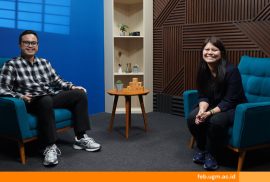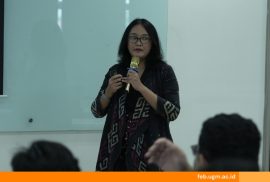Wednesday (27/09), the Department of Accounting at the Faculty of Economics and Business, Universitas Gadjah Mada (FEB UGM) incollaboration with Internal Monitoring Unit Communication Forum (FKSPI) organized a public lecture titled “Practical Implementation of Risk Management and Internal Audit in State-Owned Enterprises.” Held at the Auditorium of the Master of Management Program at FEB UGM, this public lecture aimed to share the latest information on risk management and internal control within the context of State-Owned Enterprises (BUMN). Managing both of these aspects is crucial in the administration of a company.
The event began with the singing of the national anthem, “Indonesia Raya.” Afterwards, Gumilang Aryo Sahadewo, S.E., M.A., Ph.D., the Vice Dean for Research, Community Service, Collaboration, and Alumni Affairs at FEB UGM, gave a welcoming address. The official session of the public lecture then commenced. This public lecture was moderated by Drs. Haryono, M. Com, a lecturer in Accounting at FEB UGM and also the Chief Commissioner of the People’s Credit Bank (BPR UGM).
Next, the session continued with an explanation by the first speaker, Nawal Hely, who serves as the Deputy of Finance and Risk Management at the Ministry of State-Owned Enterprises (BUMN). To begin with, she explained that risk can be defined as a deviation from the vision and mission of a company, including BUMN. BUMN itself has two objectives: economic value added and social value added. Therefore, deviations from these two objectives can be considered as risks.
Furthermore, BUMN had three main aspects: organizational governance, risk management, and reporting and transparency. But in this lecture, the main topic was risk management. The Ministry of BUMN itself initiated the development of risk governance guidelines that promote central values: (1) strategically oriented risk management compared to compliance and audit, (2) forward-looking and preventive perspectives compared to historical perspectives, (3) embedded in the business activities of individual BUMN and BUMN holding, and (4) the use of effective technology and reporting methodologies.
BUMN also had four foundational pillars in risk management. These four pillars include (1) active management by the board of directors overseen by the Board of Commissioners/Supervisory Board; (2) adequacy of policies and standard risk management procedures and the formulation of risk strategy; (3) sufficiency of risk identification, measurement, treatment, monitoring processes, and risk management information systems; and (4) a comprehensive internal control system. Throughout the process, there are three lines of defense in BUMN, namely components in the first, second, and third lines. Members at each level work together to minimize risks for the company.
The event continued with a presentation by Triswahyu Herlina, the Chief Audit Executive of Bank Rakyat Indonesia (BRI). She presented insights on sustainable governance in the BUMN environment on this occasion. Currently, BUMN, especially BRI, has experienced a transformation in two aspects: the digitization of business and a focus on a performance-driven culture. To achieve the objectives of this transformation, BRI has implemented various efforts, including strengthening internal audit implementation. As a manifestation of good corporate governance, internal audit also contributes to maintaining the company’s sustainability.
This audit process can mitigate the risks the company faces, earning it the title of “risk-based internal audit.” The stages of the audit process at BRI include annual audit planning, individual audit execution, and reporting and monitoring. Additionally, BRI has consolidated its audit processes by restructuring the organization within the Internal Audit Directorate and transforming the aspirations of audit implementation, namely, audit as a reinforcement of risk mitigation.
On the other hand, BRI has expanded the scope of its audits, giving rise to what is known as Internal Audit 4.0. Internal Audit 4.0 encompasses assurance and advisory aspects as well as extends to anticipation and acceleration. Thus, this contributes to BUMN’s commitment to emphasizing preventive strategies in risk reduction. This discussion concluded the presentations by both speakers. The session proceeded with enthusiastic discussions and question-and-answer sessions from the audience. Finally, the event was documented, officially closing today’s activities.
The efforts made by the Ministry of BUMN and BUMN align with the Sustainable Development Goals (SDGs), precisely Goal 8. More specifically, they aim to achieve Target 8.2, which is to attain higher economic productivity, including through technological innovation. BUMN continually innovates to minimize its risks, such as establishing risk management regulatory frameworks and strengthening internal audits. Ultimately, these innovations lead to increased productivity in their operations.
Reportage: Rizal Farizi





